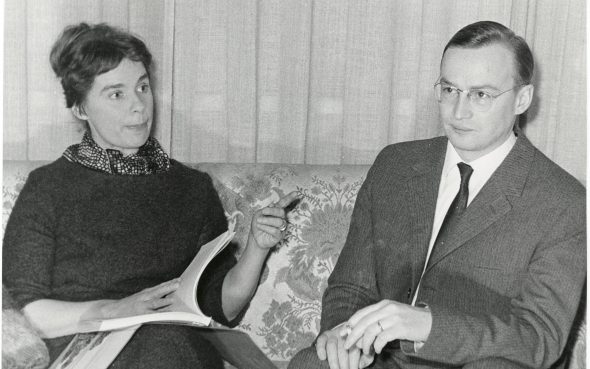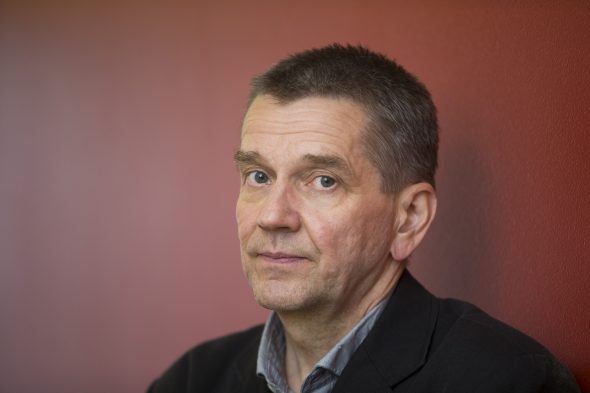Archive for June, 1984
Poems
Issue 2/1984 | Archives online, Fiction, poetry
Interview by Philip Binham
Birdmount
I hear a happy tale, it makes me sad:
no-one will remember me for long.
I will send a letter with nothing inside, the emptiness will reek
as the pines do, of fruit-peel and of smoke,
a scent only.
Here I have stayed a week, seven riverside days.
The river treads the mill, ah, treads the mill,
the river’s wide, this is a placid reach, the sky is near:
smoke, like the shadow of a birdflock passing, nothing else.
And now it is September:
there are more pine trees here, and more darkness too. More…
The power game
Issue 2/1984 | Archives online, Fiction, Prose
Puhua, vastata, opettaa (‘Speak, answer, teach’, 1972) could be called a collection of aphorisms or poems; the pieces resemble prose in having a connected plot, but they certainly are not narrative prose. Ikuisen rauhan aika (‘A time of eternal peace’, 1981) continues this approach. The title alludes ironically to Kant’s Zum Ewigen Frieden, mentioned in the text; ‘eternal peace’ is funereal for Haavikko.
In his ‘aphorisms’ Haavikko is discovering new methods of discourse for his abiding preoccupation: the power game. All organizations, he thinks, observe the rules of this sport – states, armies, businesses, churches. Any powerful institution wages war in its own way, applying the ruthless military code to autonomous survival, control, aggrandizement, and still more power. No morality – the question is: who wins? ‘I often entertain myself by translating historical events into the jargon of business management, or business promotion into war.’
‘What is a goal for the organization is a crime for the individual.’ Is Haavikko an abysmal pessimist, a cynic? He would himself consider that cynicism is something else: a would-be credulous idealism, plucking out its own eyes, promoting evil through ignorance. As for reality, ‘the world – the world’s a chair that’s pulled from under you. No floor’, says Mr Östanskog in the eponymous play. Reading out the rules of a mindless and cruel sport, without frills, softening qualifications, or groundless hopes, Haavikko is in the tradition of those moralists of the Middle Ages, who wrote tracts denouncing the perversity and madness of ‘the world’ – which is ‘full of work-of-art-resembling works of art, in various colours, book-resembling texts, people-resembling people’.
Kai Laitinen
Speak, answer, teach
When people begin to desire equal rights, fair shares, the right to decide for themselves, to choose
one cannot tell them: You are asking for goods that cannot be made.
One cannot say that when they are manufactured they vanish, and when they are increased they decrease all the time. More…
Hotel for the living
Issue 2/1984 | Archives online, Fiction, Prose
An extract from Hotelli eläville (‘Hotel for the living’, 1983). Introduction by Markku Huotari
Raisa and Pertti are a married couple with three children, Katrielina, Aripertti and Artomikko. When she discovers she is to have another, whom she names Katjaraisa, Raisa decides to have an abortion, because another child, even if welcome, would now jeopardise her career – she has been offered a job with an international company at the very top of the advertising world. Raisa is the successful entrepreneur of the novel – on the one hand coldly calculating, without feeling, on the other superficially sentimental, perhaps the most startlingly ironic of the characters in Jalonen’s novel. His image of the brave new woman?
During her lunch hour Raisa took a walk via the laboratory, asked reception for the envelope and thrust it unregarded into her handbag. She was aware of her already knowing, but short of the envelope, there would as yet be no restrictions, nor were there any decisions that would have to be made. She had called Tom Eriksson, discussed yet again the same points and particulars, and ended tracing a finger over the two beautiful pictures on her wall. ‘The loveliest of seas has yet to be sailed’ and ‘I am life! For Life’s sake.’
She thought of Katjaraisa, her features, the palms the breadth of two fingers, just as Katrielina’s had been, and the same button-eyed gazing look as Katrielina. More…


